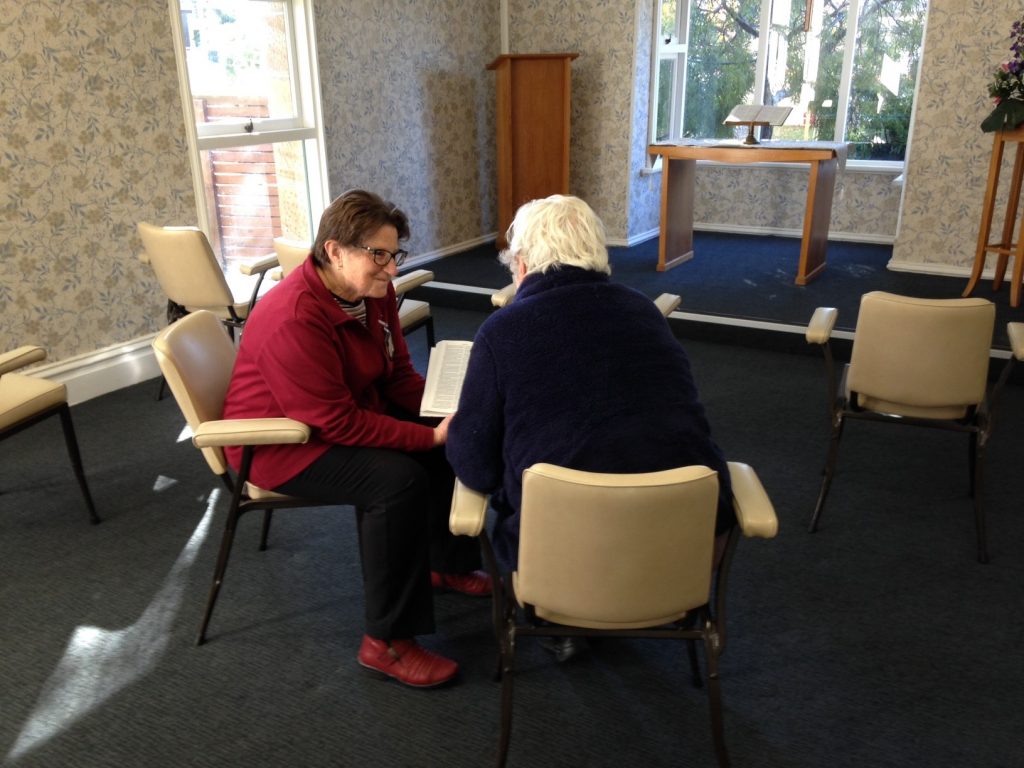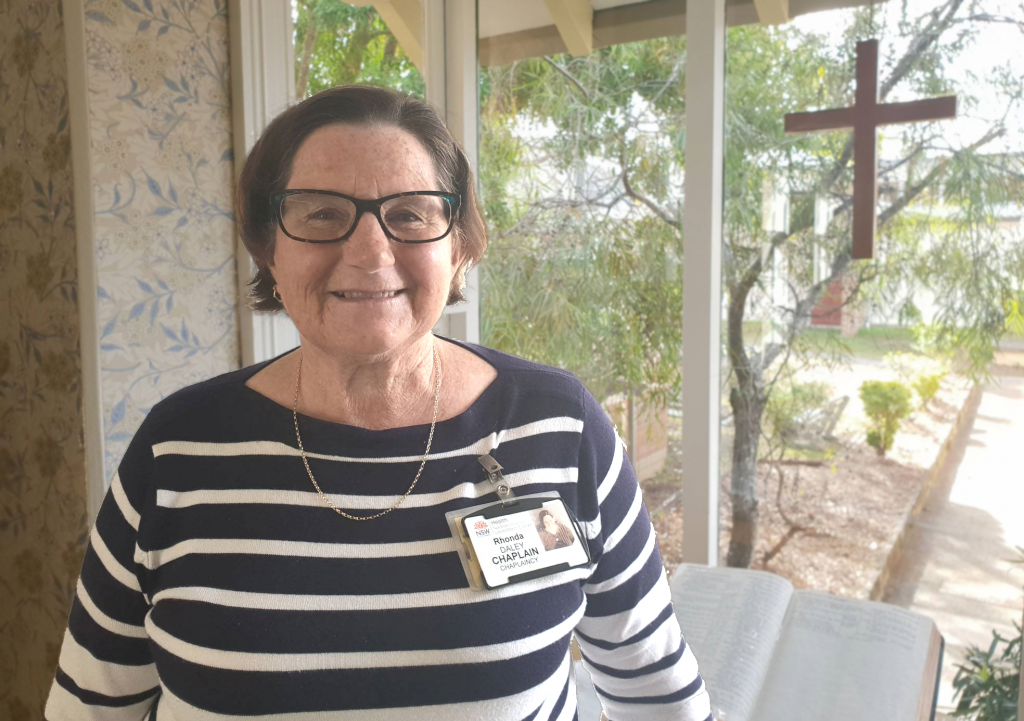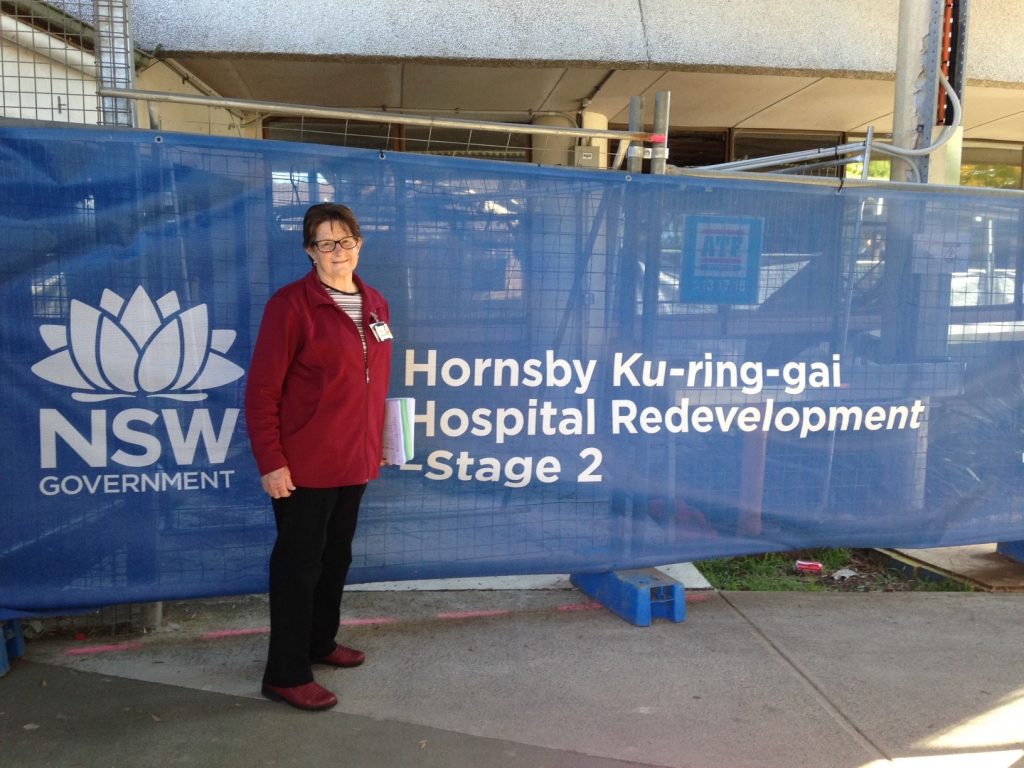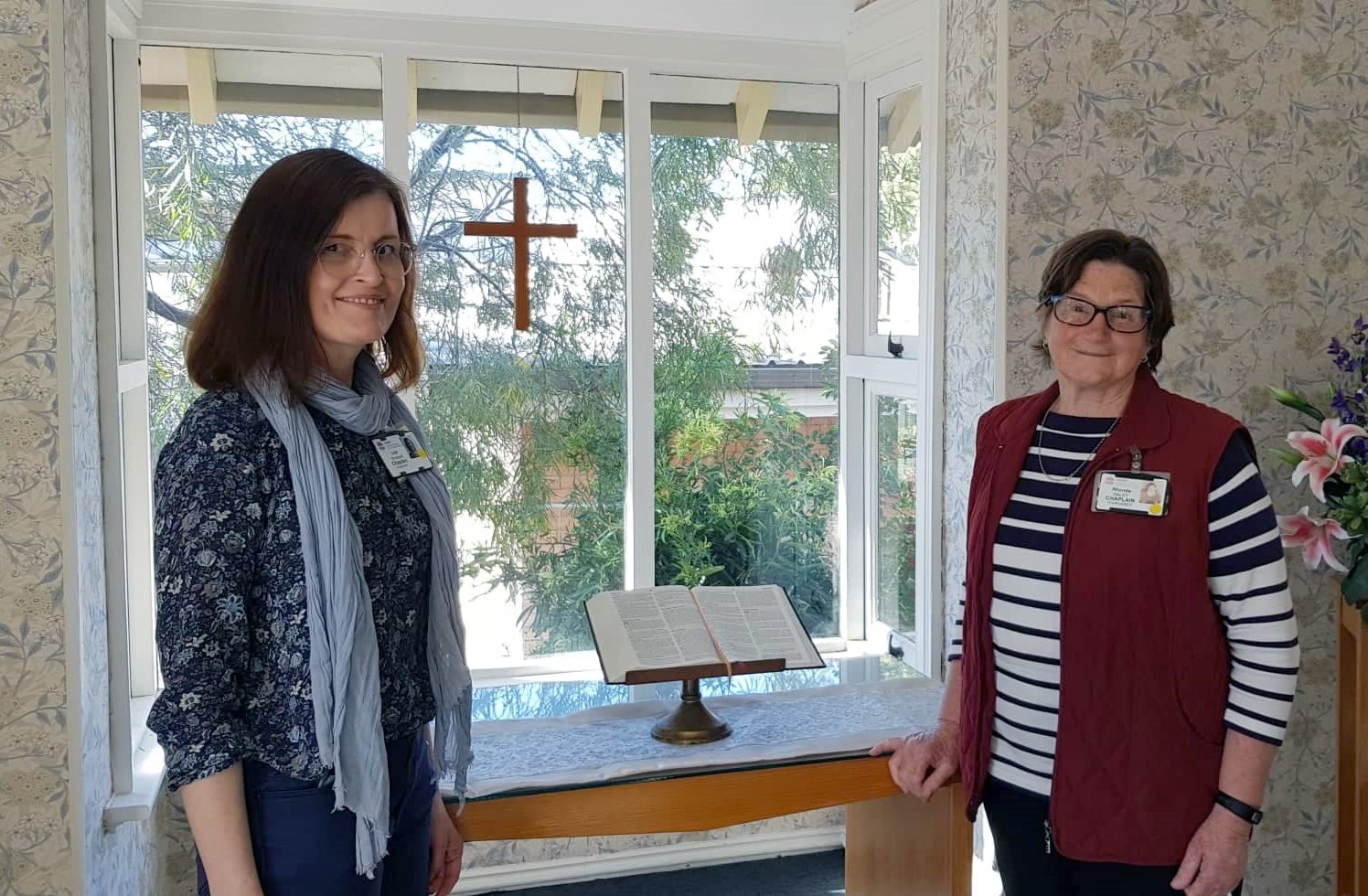
Rhonda Daley is retiring from her role as Jericho Road Chaplain at Hornsby Hospital and passing the baton over to Lisa Woolcott. We interviewed Rhonda to find out about her journey into chaplaincy, the highs and lows and how God prepared and directed her path along the way.
It all started more than twenty years ago, when Rhonda, mother of three was working as a full-time preschool teacher. Rhonda’s minister at Wahroonga Presbyterian, shared a book he had read called ‘Can the Pastor Do It Alone?: A Model for Preparing Lay People for Lay Pastoring’. This prompted the church to start a pastoral care ministry and Rhonda felt led to take up the opportunity and reduced her work days from five to four.
Every Wednesday, Rhonda would accompany her minister, visiting nursing homes and hospitals to see if pastoral care was a good fit and something she would enjoy. “I wasn’t good at it, by any stretch of the imagination. I wasn’t a good listener… but I liked it!” says Rhonda. Loving the work but wanting to improve, Rhonda signed up to a course one day a week called ‘Clinical Pastoral Education (CPE)’ at the SAN. The course was helpful, but Rhonda was frustrated with its secular nature. She remembers thinking ‘What is the point of just actively listening to people when the power and the hope that people want is in the Gospel’.
With her preschool experience, love of children and the training course under her belt, Rhonda wondered how to put all this together. So, she phoned the chaplain at Westmead Children’s Hospital and asked if they could do with a volunteer chaplain. They said “Yes”, and Rhonda started at the hospital one day a week.
Over the next 12 months Rhonda was mentored by the chaplain who, when deciding to retire, encouraged Rhonda to apply for her position, “…and by the grace of the living God I was employed by the Presbyterian Church to be the full-time Chaplain at Westmead Children’s Hospital”, recalls Rhonda, still full of joy from that memory 22 years ago.

Growing in experience but wanting a solid Biblical foundation, Rhonda applied to become a Deaconess with the support of her church, presbytery and the college. She studied 7 years part time and recollects, “…my goodness, there goes my social life I tell you”.
When the Presbyterian Church bought Allowah Children’s Hospital, they restructured Rhonda’s week between Westmead Children’s Hospital and Allowah.
It was a very good mix as Rhonda would come across the kids who would move between the two hospitals and she loved supporting the children and their families.
On one occasion at Westmead, Rhonda remembers the father of a child with cancer coming into the chapel in tears. Overwhelmed by the situation, he couldn’t bear to be in the room with his child. Asking Rhonda, “What sort of father am I, that I don’t want to be there?”. With God’s great wisdom, Rhonda shared that when we have a burden too great to carry, we have a God to run to. Reframing that the father was not abandoning his child, or running FROM the situation, he ran to the chapel so perhaps he was also running TO God.
Like other Chaplains, Rhonda has found that a medical crisis can often lead to an existential crisis of ‘Who am I?’ and ‘What does this mean?’, which is why chaplaincy is so vital. Supporting families, leading funerals, it can all be hard. But she says “…even when it’s hard, it’s a blessing every time”.
After many years in this role, Rhonda moved to Hornsby Hospital which was closer to home and is where she has been working ever since.

This new role provided new opportunities as well as new challenges. “Pastoral care to adult patients is quite different to children and teens and needed a lot of adjustments in thinking”, says Rhonda. After conducting many funerals for children, teens and babies, she had to officiate her first adult funeral. Funerals and public speaking are things she finds difficult and draining. She says she learnt to depend even more upon God’s grace whether it’s while supporting families or navigating hospital politics.
During this time, Rhonda says she discovered the value of the single visit. “The small things, like one, two or three visits can have a big impact on someone’s life. I’ve grown to discover the value of pastoral care – it has an enormous value in people’s life. The joy of watching God at work – and He’s been transforming me over the years too”.
Rhonda is about to retire and pass her position as Hornsby Hospital Chaplain over to Lisa Woolcott.

Rhonda says, “Passing on the baton, I’ve been given this amazing opportunity and now it’s my turn to pass it onto Lisa. I hope she has as much joy as I have had. There is a sadness about leaving but there is a joy that eclipses that, as God has raised up Lisa to take over the role. I will be praying for Lisa and I hope the rest of the church will be generously praying for her too. Wherever God’s got a new fresh outpouring of blessing we have to be praying.”
Reflecting on her years in chaplaincy, Rhonda says the call to this ministry, knowing without a doubt that this was what God wanted her to do, grew stronger and clearer over the years. “This meant I could relax and trust Him to carry me through the challenges. Just like 1 Thes 5:24 says, ‘The One who calls you is faithful and he will do it’, I knew that I was not up to any of this on my own”.
During retirement, Rhonda says she’s going to go deeper and slower with God. She is active in her church, Hornsby Presbyterian Church and teaches scripture two days a week. She has also had her piano tuned recently and is going to take lessons. Rhonda has been mentoring Christian Women in Ministry in her spare time for several years and will gladly continue this through retirement.
“I want to give God all the glory for carrying me through each day of each year of chaplaincy ministry. That is the real faithfulness and power!”
We asked Rhonda if she could share some insights from her two decades in chaplaincy.
-
Listen well
Approach pastoral care with respect and listen carefully to where someone is at - all you can do is offer. Listen to them so you can tailor your response to their particular circumstance and give people the space to engage in conversation.
-
Biblical foundation
You need a good Biblical foundation to be able to respond to questions. Explore theological education to get a solid grounding. Even if it’s not for a particular ministry, it’s important that when you come across people who ask those tough questions, you’re ready to give an answer. People will only listen for about 30 seconds, so you need to be concise, ready and clear about your own theology. The Christ College/Jericho Road Chaplaincy Training Courses are brilliant. Even just for personal growth in being an effective member of your own church or community.
-
Be prepared
If someone asks you ‘Why do you believe in God?’ it’s important to have your response ready so you can say, ‘There are four reason why I believe in God’, and they can pick up on any of those responses. And then you can turn it over to them using respectful curiosity, saying ‘What do you think about God?’. It is also important to have a clear theology of suffering settled before a tragedy happens.
-
Pray
Pray for chaplaincy, I know when I’ve been carried in my day, carried by God through prayer. All the chaplains at Jericho Road appreciate your prayers.
-
Consider chaplaincy
We need more people raised up for positions like this. Chaplains are partners with the local church, respectfully engaging with people of all faiths, at a spiritually strategic time in their lives. Whether it’s in hospitals, prisons, police or sports teams, people need real spiritual help, support and hope.
-
Give
The thing that often keeps me going when things are hard is knowing that individuals and churches have given generously so I could have this ministry opportunity - that motives me to do my job well. It reminds me that I’ve been placed here on trust and behind me are God’s people who are generously giving and praying.

Pingback: When God makes a way - Jericho Road
Pingback: Top 3 passages for people who are hurting - Jericho Road